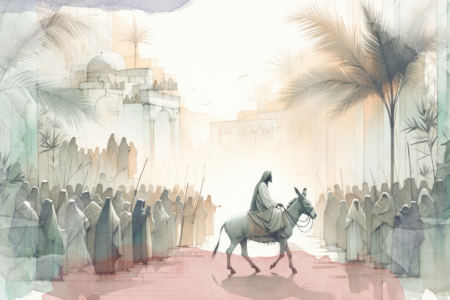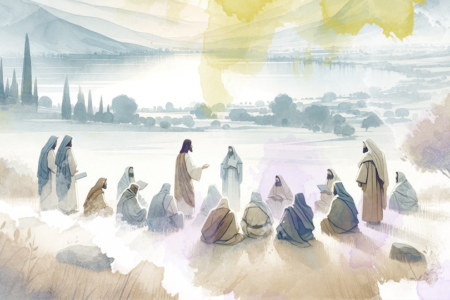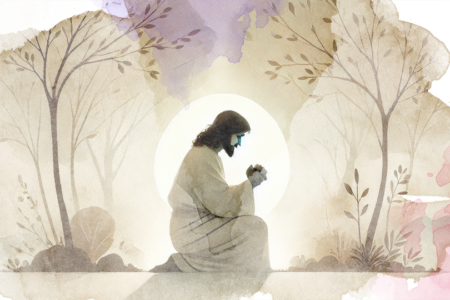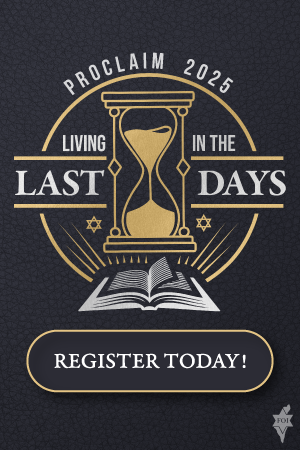Immortality in Jewish Thought
“Where Do We Go From Here?”
“Dear Mr. Segal: Is there a heaven and, if so, what are my chances of getting there?”
So wrote sometime ago an elderly Jewish lady to the late columnist, Alfred Segal.
“Maybe you can tell us where—if any place—we are all going from here. My husband and I, since we are so well along in years, from time to time ask ourselves that question, but we never get the answer. What is your idea and what does our Bible say about it?”
To this anguished inquiry Mr. Segal had no definite answer.
There are millions of Jews who, like that Jewish lady, are asking with mounting anxiety:
“Where do we go from here?”
“Is there a heaven?” “What must I do to obtain eternal life?” Sooner or later all of us will have to face this all important question, “Where do we go from here?”
Let us therefore turn to the Bible to see what the Word of God has to tell us about these things. Let us further investigate the Jewish teaching on this subject through the centuries.
Upon rising in the morning every pious Jew is enjoined to say the follow prayer:
My God! The soul which thou hast given me is pure. Thou hast created her, Thou hast formed her, Thou hast breathed her in to me, Thou watchest over her while she is in me. In the future Thou wilt take her away from me and Thou wilt also restore her to me in the future. As long as the soul is within me I thank the Jehovah, my God, and the God of my Fathers, Master of all things, and Lord of all souls. Blessed art Thou, Jehovah, who returneth the souls to dead bodies.
Such has been the faith of traditional Judaism throughout the ages in the immortality of the soul and in the resurrection of the body.
Here we can only treat this all important subject in a cursory manner. To do justice to this vital subject it would be necessary to write a comprehensive work consisting of several volumes.
Immortality in the Old Testament
The Old Testament does not set out to prove that man is immortal. It assumes it, just as it assumes the existence of God, without attempting to prove it. God is the source of all reality. He is the supreme Reality. The soul is immortal because He who created the soul of man is Himself immortal.
The Book of Genesis tells us that God is the Creator of all life, whether plant, animal or human. Only of man has it been said that he was created in the image and likeness of God.
And God said, Let us make man in our image, after our likeness. . . . So God created man in his own image, in the image of God created he him; male and female created he them – Gen. 1:26, 27.
Genesis also tells us that the life of man is the breath of God.
And the Lord God formed man of the dust of the ground, and breathed into his nostrils the breath of life; and man became a living soul – Gen. 2:7
The somber view expressed in Ecclesiastes does not represent the faith of Solomon but rather the position of perplexed man who looks at life apart from God.
For that which befalleth the sons of men befalleth beasts; even one thing befalleth them: as the one dieth, so dieth the other; yea, they have all one breath; so that a man hath no preeminence above a beast: for all is vanity. All go unto one place; all are of the dust, and all turn to dust again – Eccl. 3:19, 20.
Solomon’s real faith in the immortality of man is reflected in the following passages:
Then shall the dust return to the earth as it was: and the spirit shall return unto God who gave it – Eccl. 12:7.
Longfellow, in his well-known poem, gives expression to the same faith in these words:
Tell me not, in mournful numbers,
‘Life is but an empty dream!’
For the soul is dead that slumbers,
And things are not what they seem.
Life is real Life is earnest!
And the grave is not its goal;
‘Dust thou art, to dust returnest,’
Was not spoken of the soul.
Perhaps the clearest statement of faith in the immortality of man has been voiced by Job:
For I know that my Redeemer liveth, and that he shall stand at the latter day upon the earth : and though after my skin worms destroy this body, yet in my flesh shall I see God: whom I shall see for myself, and mine eye shall behold, and not another; though my reins be consumed within me – Job 19:25-27.
Coming to the Psalms we find numerous passages which clearly express faith in eternal life, life with God beyond the grave:
I shall be satisfied, when I awake, with thy likeness – Ps. 17:15.
God will redeem my soul from the power of the grave: for he shall receive me. – Ps. 49:15.
Thou shalt guide me with thy counsel, and afterward receive me to glory – Ps. 73:24.
The same faith in the final victory of God over death is also expressed by the prophets:
He will swallow up death in victory – Isa. 25:8.
It is interesting to note that a similar faith in God’s final victory over death is expressed in the well-known Passover song, “Had-Gadya” – One Little Kid – which closes with the following passage:
“Then came the Holy One, blessed be His Name, and slaughtered the angel of death.”
Here we have an echo of St. Paul’s words:
“The last enemy that shall be destroyed is death” – I Cor. 15:26.
The vision of the valley of dry bones in Ezekiel 37:1-28, while it applies primarily to the resurrection of Israel as a nation, nevertheless presupposes the faith in the resurrection of the individual person without which national resurrection would be inconceivable. The dramatic description of the physical resurrection is here used as a figure of national resurrection:
So I prophesied as I was commanded: and as I prophesied, there was a noise, and behold a shaking, and the bones came together, bone to his bone. And when I beheld, lo, the sinews and the flesh came up upon them, and the skin covered them above: but there was no breath in them.
Then said he unto me, Prophesy unto the wind, prophesy, son of man, and say to the wind, Thus saith the Lord God; Come from the four winds, O breath, and breathe upon these slain; that they may live. So I prophesied as he commanded me, and the breath came into them, and they lived, and stood up upon their feet, an exceeding great army – Ezek. 37:7-10.
In this majestic scene the resurrection is visualized as a recreation of the bodies of men by the power of God’s command and God’s breath.
Again in Daniel 12:2 we read:
And many of them that sleep in the dust of the earth shall awake, some to everlasting life, and some to shame and everlasting contempt.
These at-random-quoted passages from various Old Testament writers, covering many centuries of Jewish spiritual history, reflect the universal faith of ancient Israel in the immortality of man’s soul which has been created by the Spirit of God.
Immortality in Post-Old Testament Literature
When we come to post-Old Testament literature, covering the 400 year period between the Old and New Testaments, we have an ever-growing volume of testimony to the faith of the Jews in the immortality of the soul and the resurrection of the body.
The literature of this period is known as the Apocrypha and the Pseudepigrapha. The Apocrypha, a Greek word, means the hidden or mystical writings. Later it took on the connotation of legendary or spurious literature. These writings, though considered as helpful and edifying, were not included by the Jews in the canon of the Old Testament, and were never considered as God-inspired. Some of the rabbis even frowned on the reading of these writings, which they called External Books.
Nevertheless, the Apocrypha and Pseudepigrapha are important to use as historical documents from which we are able to learn about the beliefs of the Jews in the period between the Testaments.
Of special importance to our subject is The Book of Enoch (Approximately Middle Second Century. B.C.) There the fate of the righteous in the hereafter is thus described.
And the righteous and elect shall be saved on that day
And they shall never thenceforward see the face of the sinners and unrighteous
And the Lord of Spirits will abide over them
And with that Son of Man shall they eat
And lie down and rise up for ever and ever.
And the righteous and elect shall have risen from the earth
And ceased to be of downcast countenance – Enoch 62:13-15.
On the other hand the fate of the unrighteous is pictured in this manner:
Now they will say unto themselves: ‘Our souls are full of unrighteous gain, but it does not prevent us from descending from the midst thereof into the burden of Sheol.’
And after that their faces shall be filled with darkness
And shame before that Son of Man,
And they shall be driven from his presence,
And the sword shall abide before his face in their midst – Enoch 63:10, 11.
It is interesting to note that here the Messiah is referred to as “The Son of Man,” a term first used in the Book of Daniel (Ch. 1:13).
In the New Testament the Lord Jesus often referred to Himself as “The Son of Man.” Altogether it must be observed that the faith in the immortality of the soul and the resurrection of the body becomes more and more outspoken as time goes on, and is closely linked to the coming of the Messiah, when all accounts will be settled and divine justice shall finally prevail.
According to the Book of Enoch, after death there will be judgment when God and the Messiah will be the Judge. Then will God and the Messiah be vindicated and triumph. In those days the Lord bade (them) to summon and testify to the children of earth concerning their wisdom: Show (it) unto them; for ye are their guides, and a recompense over the whole earth. For I and My Son will be united with them forever in the paths of uprightness in their lives; and ye shall have peace: rejoice, ye children of uprightness. Amen – Enoch 105:1, 2.
Another apocryphal book, known as The Wisdom of Solomon, speaks about the righteous man after death in this manner:
But the righteous man, though he die before his time, shall be at rest, –
For honourable old age is not (reckoned) by length of time.
Nor is it measured by the number of years;
But understanding is grey hairs unto me,
And an unspotted manner of life is ripe old age; –
Being well-pleasing unto God he was beloved,
And living among sinners he was translated;
He was caught away lest wickedness should change his understanding,
Or guile deceive his soul – Wisdom of Solomon 4:7-11.
The Apocalypse of Baruch, believed to have been written about the year 100 A.D., gives expression to the life of the hereafter:
In what shape will those live who live in Thy day?
For in the heights of that world shall they dwell,
And they shall be made like unto the angels,
And be made equal to the stars,
And they shall be changed into every form they desire,
From beauty into loveliness,
And from light into the splendour of glory – Baruch 49:2; 51:10.
We note then that in the literature of the inter-testamental period faith in the immortality of the soul and the resurrection of the body became more emphatic and outspoken than in past centuries. This faith often has a strong resemblance to the New Testament teaching on the same subject.
In the next issue we will deal with Immortality in the Talmud, Immortality in the New Testament and The Resurrection Body.






